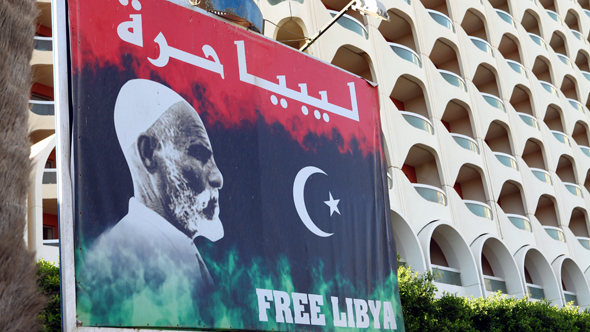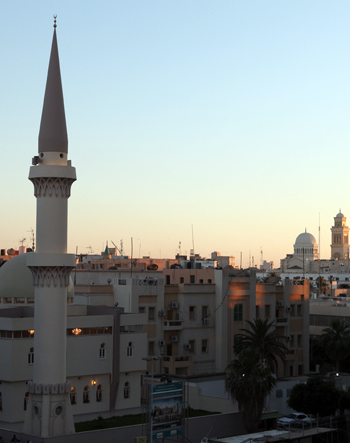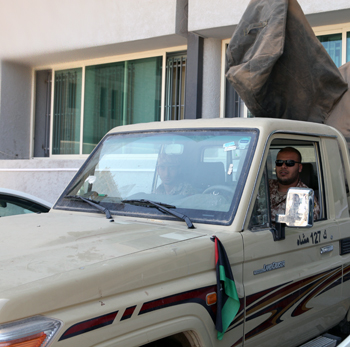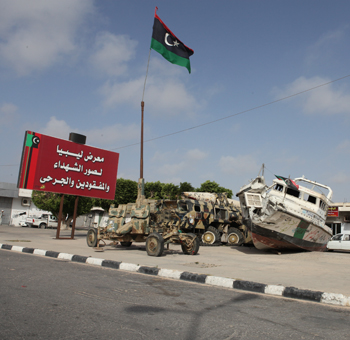Current Security Situation in Libya | Latest Overview
Libya Top Stories
Current Security Situation in Libya | Latest Overview
At question on the issue of security in Libya, is exactly how chaotic is the country; can foreign business operate there safely, and are those clashes that take place being overly headlined by the news media?

Current Security Situation in Libya | Latest Overview
Libya’s militias: a mélange of anti and pro-government
By TK Maloy
TRIPOLI – At question on the issue of security in Libya, is exactly how chaotic is the country; can foreign business operate there safely, and are those clashes that take place being overly headlined by the news media?
Like most countries who have lost their strong man dictator, Libya is in political flux, with the General National Council and leadership still finding their political legs, including trying to form a centralized security force out of the former rebel brigades (known as “Thwar”,) amid radical Islamist parties refuting the democratic process altogether, and various armed militias exercising unilateral power under warlord leadership, including Al Qaeda militants coming from Mali through porous southern border.
Misrata is home to the largest number of militia forces in Libya, with 230 separate militias running a rotating system for policing duties. All entrances to the city have “gates”, checkpoints where each vehicle is inspected.
Consequently, Misrata, is also considered one of the safest cities in Libya.
After the overthrow and death of longtime dictator Muammar Gaddafi in 2011, many of the armed rebel groups have officially joined the ranks of the army, while other groups maintain linkages to the government and others have continued to operate autonomously, often against government policy, with a number of attacks taking place across the county by armed groups. A short list of attacks – by a variety of groups with differing ideologies — for the last half year, includes a number of car bombs in Benghazi; an attack on a foreign oil installation, and a car bomb attack on the French Embassy in Tripoli.
During the rocky transitional period after the successful rebellion, the Libyan government has promulgated several policy stances regarding the militias, with the army shutting some groups, while giving official sanction to many of more powerful brigades which fought against the Gaddafi regime.
According to the Libyan Herald, Misrata is home to the largest number of militia forces in Libya, with 230 separate militias running a rotating system for policing duties. All entrances to the city have “gates”, checkpoints where each vehicle is inspected.
Consequently, Misrata, is also considered one of the safest cities in Libya.
Nevertheless, there has been growing sentiment against armed groups by Libya’s citizens, particularly in the wake of various militias laying siege to government ministries in Tripoli. The former rebel fighters that surrounded the foreign and justice ministries were demanding the expulsion of any officials who had worked under the Gaddafi regime.
The safest city is Misrata
In the most headlined clash, Benghazi was the scene last  September of an attack on the US consulate in the city which resulted in the death of the American ambassador and three US security personnel defending the complex. After the attack, there were a number of large protests directed at the various militias in the city.
September of an attack on the US consulate in the city which resulted in the death of the American ambassador and three US security personnel defending the complex. After the attack, there were a number of large protests directed at the various militias in the city.
Most recently, also in Benghazi, an anti-militia protest turned deadly June 8, when at least 31 persons were killed and dozens more wounded after protestors stormed the headquarters of the Libya Shield Brigade, a para-military unit linked with the Defense Ministry.
In an official statement, Prime Minister Ali Zidan called the clash “sad and painful,” adding that Libya citizens should exercise self-restraint on the continuing issue of autonomous armed militias. Zidan reported that the protesters were objecting to checkpoint at the entrance of Benghazi operate by the brigade and demanded that members of the Libya Shield leave their base in order that the police and army could occupy the encampment. Further details would be released pending an investigation into the deaths, the PM said.
According to news reports, one local activist, said: “People protested because they believe militias go against Libya’s stability, which can only be achieved through a proper army and police.”
Given the various political and security challengers, the nascent government had shown marked cohesiveness. Albeit one evolving toward a status quo of protecting citizens, foreign business and maintaining federal power. The government is dogged by the dysfunctional past record to a government and bureaucracy that were erratic at best under the eccentric rule of the “Brother Leader” Muammar Gaddafi.
Also compounding the problem is an issue that has been a negative factor in all the Arab Spring countries – unemployment, and particularly unemployment of young people.
Hafed Al-Ghwell, an advisor to the World Bank Group, recently wrote: “The end of Gaddafi’s regime has led to a situation where security is highly fragmented. Multiple groups believe that they contributed significantly to the ousting of the former regime and have legitimacy to continue functioning. This situation has occurred, of course, because the uprising in the country was highly decentralized.  Many armed groups do not see themselves as serving a central authority, and in fact have separate procedures to register members and weapons, as well as to arrest and detain suspects. Groups in the east and west of the country were often structured differently, had multiple and separate chains of command and objectives.”
Many armed groups do not see themselves as serving a central authority, and in fact have separate procedures to register members and weapons, as well as to arrest and detain suspects. Groups in the east and west of the country were often structured differently, had multiple and separate chains of command and objectives.”
If the Libya’s new leaders can definitively solve the ongoing security issue, it will open the doors – helped by the strong oil economy – to increased employment and the establishment of foreign business and investment.
In a show of confidence, Richard Griffiths, president of the American Chamber of Commerce in Libya, based in Tripoli, told “Venture Africa” magazine, “It is key to be in Libya,” says Griffiths. “To understand the market is to be fully aware of the country. The value of visiting Libya and seeing it firsthand is significant [enough to] open up new business channels and models.”
Economy Minister Mustafa Abufunas said in recent remarks that Libya “wanted to send a message to the world that it is safe and able to build its economy. It will need a huge effort”, he noted, adding, “and it is no great secret that it’s going to take an effort thanks to the legacy of 40 years past.”
Trading and transit zone to Europe
The Libyan Business Council would like to see Libya once again become the trading and transit zone to Europe – a status which it formerly enjoyed before the Gaddafi years – and also to assure the security situation is such that the tourism sector would undergo a renaissance for the tourism sector.
Mohamed Alhanghri, a member of the Libyan Businessmen Council, told Marcopolis, “We are aiming to return Libya to its previous status as a trading and transit zone to and from Europe, after this role was neglected for the past 48 years. We also aim to have several trading and exchanging sea ports between Libya, Europe and America, the traditional trading partners.”
Alhangri concluded: “As for the industrial sector, we are preparing the plans for over 60 new industrial areas in all of Libya, and that will be an attractive factor to foreign investment. We also aim to have new and free trading zones for commercial exchange. Even the services sector is active in Libya and that also attracts foreign investments.”
Many International planning experts have said that going forward Libya must have a not only a national dialogue but also inclusively local, including smaller municipalities, tribal leaders and other stakeholders.
In other to build a common vision for the new Libya, planning must take into account the daily lives of citizens, including employment and security considerations, while enabling the body politic to share in a building a viable state that can take its place on the world stage as a democratic, economically productive, and open to new and innovative ideas on oil wealth sharing, human rights, and rule of law.
Mohamed A. Elfigih, Chairman of the Libyan Iron & Steel Company (LISCO) believes that the security situation is growing less dangerous, as evidenced by the number of foreign businesses traveling to the newly created country.
“I would say that the security level is improving and apart from a few occurrences from time to time in the southern and eastern regions, the western region and particularly Misrata has nearly achieved a normal security level,” Elfigih said. “We are receiving, different visitors from different companies from the UK, Germany, Italy, the Arab countries etc. nearly every week.”